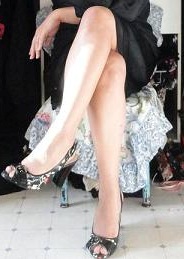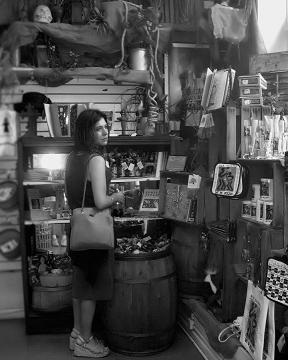Poet's Corner by Russell Bittner
Interview with Jennifer Reeser
December is the month for gift-giving. And I can think of no better gift to give you, our readers, than the poetry of Jennifer Reeser. (Yes, opportunist that I am, I’m giving myself the same gift.)
How did I find Jennifer? Her poetry appears on a regular basis alongside that of our two previous interviewees, Sally Cook (November) and Tom Riley (October) in Trinacria. Now, who woulda thunk that a young lady from Lake Charles, Louisiana would allow her work to appear in a big, bad Brooklyn rag? Well, you’re about to find out that while Jennifer may be a Southern Belle, she ain’t no wilting Magnolia. A bellwether? Sure. A belletrist? Absolutely. (Just for starters, she keeps command of both Russian and French as spare toy soldiers in her purse.)
I read a couple of her poems, then sent her an invitation by e-mail. She responded overnight, and nous voilà.
As the host of “Poet’s Corner,” I would be unforgivably remiss if I neglected to introduce Jennifer by way of her bio. So, here we go:
RRB: Jennifer, before we look at “Her Feet” or “Dinah Dreams of Terrorists”—both of which I found in the most recent issue of Trinacria, tell us something about them legs, will ya? How does a mother of five do it—not to mention, find and keep the piece (sic) of mind to write poetry?
Jennifer, before we look at “Her Feet” or “Dinah Dreams of Terrorists”—both of which I found in the most recent issue of Trinacria, tell us something about them legs, will ya? How does a mother of five do it—not to mention, find and keep the piece (sic) of mind to write poetry?
JDR: Ah, the legs! They served me briefly for a shoot or two—in a moribund-on-arrival foray into modeling—my first months in college. As far as composing poetry with children running around—I began writing at about the age of twelve, and later had to figure out a way to balance it with the time I’d otherwise devote to schoolwork, household chores, community duties and the like. So, by the time the children came along a few years later, those habits (e.g., of knowing how to hold concepts, phrases, or even complete poems in my head for hours or days—or at least until I could find the time to get them down on paper) were solid. For peace of mind? There’s no mantra like a sonnet to maintain peace of mind.
Ah, the legs! They served me briefly for a shoot or two—in a moribund-on-arrival foray into modeling—my first months in college. As far as composing poetry with children running around—I began writing at about the age of twelve, and later had to figure out a way to balance it with the time I’d otherwise devote to schoolwork, household chores, community duties and the like. So, by the time the children came along a few years later, those habits (e.g., of knowing how to hold concepts, phrases, or even complete poems in my head for hours or days—or at least until I could find the time to get them down on paper) were solid. For peace of mind? There’s no mantra like a sonnet to maintain peace of mind.
Photo credit: Jason Reeser
RRB: Very good, Jennifer. Very amusing. I’ll bet when you’re standing behind a podium reciting this piece at a poetry reading, folks’re just itching to get a glance.
Very good, Jennifer. Very amusing. I’ll bet when you’re standing behind a podium reciting this piece at a poetry reading, folks’re just itching to get a glance.
 “Dinah Dreams of Terrorists” is the other piece of yours I found in the most recent issue of Trinacria. Tell us about this one, please.
“Dinah Dreams of Terrorists” is the other piece of yours I found in the most recent issue of Trinacria. Tell us about this one, please.
JDR: I’m hesitant to reveal much, since it’s part of a manuscript-in-progress. The speaker is one of the book’s dramatis personæ—one “manifestation” of a central narrator who suffers from Dissociative Identity Disorder (aka Multiple Personality Disorder, or Split Personality).
I’m hesitant to reveal much, since it’s part of a manuscript-in-progress. The speaker is one of the book’s dramatis personæ—one “manifestation” of a central narrator who suffers from Dissociative Identity Disorder (aka Multiple Personality Disorder, or Split Personality).
“Dinah Dreams of Terrorists”
“‘A’isha (Allah be pleased with her) reported that
Allah’s Apostle (may peace be upon him) married
her when she was seven years old, and she was
taken to his house as a bride when she was nine,
and her dolls were with her…”
Sahih Muslim vol.2 book 8 ch.548 no.3310,3311
p.716, by Muslim ibn al-Hajjaj Nishapuri (c. 821-875 CE)
Beheading my big brothers both before me,
Each wiping with our flag his bloodied knife,
They spoke of others, those who would adore me,
Instead of turning afterwards to gore me.
They moved like military drum and fife,
Beheading my big brothers both before me.
Beneath three tapestries depicting stormy
Paradise, with fists and rifles rife,
They spoke of others, those who would adore me.
I said, almost assured they would ignore me -
(Little they cared for love, and less for life,
Beheading my big brothers both before me)--
"But I am nine years old -- would you bewhore me?"
"Our Prophet took a girl as young to wife,"
They spoke, of others, those who would adore me.
I tried to hate them but Compassion tore me,
Submission, in their suicidal strife
Beheading my big brothers both before me,
They spoke of others, those who would adore me.
RRB: Understood. In that case, we’ll leave it alone—just like your desk in the photo immediately below.
Understood. In that case, we’ll leave it alone—just like your desk in the photo immediately below.
Photo credit: Jennifer Reeser
 Now “Compass Rose” is a piece that hits quite close to home for me, personally. It’s absolutely exquisite. Tell us a little something about it if you will.
Now “Compass Rose” is a piece that hits quite close to home for me, personally. It’s absolutely exquisite. Tell us a little something about it if you will.
JDR: As you know, “Babushka” means “grandmother.” My daughter, for whom I wrote this poem, has neither of her two grandmothers, as both my husband and I lost our mothers within one year of each other. The morning of my daughter’s birth, my mother (whose name was ‘Rose’), although she was undergoing chemotherapy treatments and was very sick at the time, came to our home and cleaned it. She then insisted on caring for me. A few months later, she was dead. There’s a lot of undercurrent here—Russia, for example, being not just a physical location, but also a symbol of the afterlife, of that “undiscovered country” to which we, the living, are forbidden.
As you know, “Babushka” means “grandmother.” My daughter, for whom I wrote this poem, has neither of her two grandmothers, as both my husband and I lost our mothers within one year of each other. The morning of my daughter’s birth, my mother (whose name was ‘Rose’), although she was undergoing chemotherapy treatments and was very sick at the time, came to our home and cleaned it. She then insisted on caring for me. A few months later, she was dead. There’s a lot of undercurrent here—Russia, for example, being not just a physical location, but also a symbol of the afterlife, of that “undiscovered country” to which we, the living, are forbidden.
RRB: Yes, Jennifer. I know that all too well. My own daughter, Alex(andra Sophia)—whose photo you’ve very kindly allowed me to insert here—is half Russian and is named in part after her great-grandmother. She’s quietly proud of that legacy—just as she’s quietly proud of her half-German legacy. My daughter—thanks to her mother’s and my efforts to steer her ship free of scorn, self-ridicule, or the sense of inferiority that comes naturally and quickly to the children of a fractured marriage—knows no shame, I’m quite happy to say.
Yes, Jennifer. I know that all too well. My own daughter, Alex(andra Sophia)—whose photo you’ve very kindly allowed me to insert here—is half Russian and is named in part after her great-grandmother. She’s quietly proud of that legacy—just as she’s quietly proud of her half-German legacy. My daughter—thanks to her mother’s and my efforts to steer her ship free of scorn, self-ridicule, or the sense of inferiority that comes naturally and quickly to the children of a fractured marriage—knows no shame, I’m quite happy to say.
“Compass Rose”
I'd buy you a Babushka doll, my heart,
and brush your ash-blonde hair until it gleams,
were Russia and our land not laid apart
by ocean so much deeper than it seems.
I have an oval pin, though—glossy lacquer
hand-made in Moscow, after glasnost came,
with fine, deft roses on a background blacker
perhaps, than history's collective shame.
I've done my best to compass you with roses:
the tablecloth, the walls, the pillowcase,
the western side-yard only dusk discloses
briefly, in Climbing Blaze and Queen Anne's lace.
May they suffice for peace when you discover
your love is not enough to turn the earth.
I dream I saw a handful of them hover
against my pane the morning of your birth.
Published in Iambs & Trochees
RRB: “Tempted to doubt your love…” is certainly a horse of a different color. Do I detect in this piece a slight cæsura in connubial bliss—and your masterful (or is it ‘mistressly’) effort to plug it up with “something like the sweetness in revenge?”
“Tempted to doubt your love…” is certainly a horse of a different color. Do I detect in this piece a slight cæsura in connubial bliss—and your masterful (or is it ‘mistressly’) effort to plug it up with “something like the sweetness in revenge?”
JDR: Yes, I would call that a good summation. Something along the lines of the old adage “The best revenge is living well,” following on the heels of Edna St. Vincent Millay’s wise observation that “"The longest absence is less perilous to love than the terrible trials of incessant proximity." Perhaps not so much a hiccup in connubial bliss as first might sound.
Yes, I would call that a good summation. Something along the lines of the old adage “The best revenge is living well,” following on the heels of Edna St. Vincent Millay’s wise observation that “"The longest absence is less perilous to love than the terrible trials of incessant proximity." Perhaps not so much a hiccup in connubial bliss as first might sound.
"Tempted to doubt your love..."
Tempted to doubt your love, I wept at last,
and flirted with the pleasures of despair,
exulted in the insults of the past,
then touched the newest silver in my hair,
finally pleased with your neglectful days,
affording, as they do, my chance to muse
so much the more on those incumbent ways
I dream you’d die for me, by bit or bruise.
Your silence will not wound me, and the words
of malice you might use are better spent
dissuading ardor from the bees and birds,
since whether or not you speak, I am content,
detecting in my circumstance a tinge
of something like the sweetness in revenge.
Published in The Lyric
RRB: Well, Jennifer, I’ll have to give you extra points for citing Edna St. Vincent Millay in this context. I don’t mind exciting certain damnation by suggesting that I long ago concluded—once I’d read her collection of sonnets—that she might be a better sonneteer even than Shakespeare.
Well, Jennifer, I’ll have to give you extra points for citing Edna St. Vincent Millay in this context. I don’t mind exciting certain damnation by suggesting that I long ago concluded—once I’d read her collection of sonnets—that she might be a better sonneteer even than Shakespeare.
 Now I’m really going to risk ridicule by asking what sonnet form you’ve chosen for your next piece. It would seem to start off in Petrarchan mode, but then shift to Elizabethan/ Shakespearean. Am I just confused? Am I demonstrating what a really rank amateur I am?
Now I’m really going to risk ridicule by asking what sonnet form you’ve chosen for your next piece. It would seem to start off in Petrarchan mode, but then shift to Elizabethan/ Shakespearean. Am I just confused? Am I demonstrating what a really rank amateur I am?
JDR: Yes, Millay is in fact considered by many to have surpassed all English practitioners of the sonnet—including Shakespeare—in her mastery of the concluding couplet at the very least. No, no confusion, on your part. This is an English sestet, preceded by an Italian octave—an older poem, which remains a favorite among my own sonnets.
Yes, Millay is in fact considered by many to have surpassed all English practitioners of the sonnet—including Shakespeare—in her mastery of the concluding couplet at the very least. No, no confusion, on your part. This is an English sestet, preceded by an Italian octave—an older poem, which remains a favorite among my own sonnets.
Photo credit: Jason Reeser
RRB: And “I’ve Been Pondering Eternity Again?” What can you tell us about this one?
And “I’ve Been Pondering Eternity Again?” What can you tell us about this one?
JDR: This is among my husband’s very favorites. It was born of my pre-occupation with two things: the future, and one of the empirical laws of science—the law of the conservation of energy—as it applies to spiritual energy. I’m one who, generally, is more concerned with the equation “E=T+V” than with “E=mc².”
This is among my husband’s very favorites. It was born of my pre-occupation with two things: the future, and one of the empirical laws of science—the law of the conservation of energy—as it applies to spiritual energy. I’m one who, generally, is more concerned with the equation “E=T+V” than with “E=mc².”
"I've Been Pondering Eternity Again"
While I was still a child, at night I lay
in stillness on my bed, stubborn to see
the farthest vestige of eternity
until within my mind, day piled on day,
each second piled thereafter, soon gave way
to such a paralyzing fear in me,
I'd countermand those thoughts impatiently—
knowing, (in time), forever couldn't stay.
By seeking paradigms outside their moment,
I'd tried to force forever to successions
of hours, as children might mistake atonement
for nothing more than sorry introspections,
then turned my bedside candle off to sleep,
with full faith that its lightlessness would keep.
Published in Troubadour
RRB: And “Souvenir” was written to your grandmother?
And “Souvenir” was written to your grandmother?
JDR: No. This was spoken of my mother. Long before her death, throughout my adolescence, I had such recurring nightmares.
No. This was spoken of my mother. Long before her death, throughout my adolescence, I had such recurring nightmares.
“Souvenir”
So many mornings I awoke in tears
from one more dream of crying at her grave,
but she was always there, secure and strong,
perfumed with talc, or Oriental spice,
with perfect words and comfort cold as ice—
the only love I ever held too long.
Published in Iambs & Trochees, reprinted in Poet's Market, 2003
RRB: Well, since I got the last one wrong, I won’t even suggest who ‘Maxim’ might be. Would you care to tell us something about this next sonnet?
Well, since I got the last one wrong, I won’t even suggest who ‘Maxim’ might be. Would you care to tell us something about this next sonnet?
JDR: I wrote this following a dream about my fourth child, Max—whom I call “Maxim”—a strongly peaceful and peace-giving child. To this day, the poem unnerves me, so vivid was the source.
I wrote this following a dream about my fourth child, Max—whom I call “Maxim”—a strongly peaceful and peace-giving child. To this day, the poem unnerves me, so vivid was the source.
“Sonnet for Maxim”
I dreamed his death, where all his tiny limbs—
surrendered underneath a window ledge
to war I neither loved nor knew by name—
lay so far from those lullabies and hymns
I longed to sing him one last time in pledge,
that distance, in itself, turned into dream.
To touch his face and innocence became
my sole necessities, my only whims,
till, just as he unfolded at the edge
of reach, my own sobs woke me with the shame
of grief, and more: that, in the global scheme,
he craved such little space in which to die.
But most: that, after battle, it would seem
no one—no one—would glance at him, or cry.
Published in PIVOT
RRB: I, personally, can’t imagine anything worse than the death of one’s child. I think you’ve made that point here, Jennifer, with both pith and poignancy.
I, personally, can’t imagine anything worse than the death of one’s child. I think you’ve made that point here, Jennifer, with both pith and poignancy.
 Mind if we move right along to something a tad lighter—and a thing we could all use right about now as December rolls ‘round?
Mind if we move right along to something a tad lighter—and a thing we could all use right about now as December rolls ‘round?
JDR: I am an avid gardener, fortunate enough—or cursed, depending upon your viewpoint—to dwell in the sub-tropics, where there’s something always still alive and in bloom.
I am an avid gardener, fortunate enough—or cursed, depending upon your viewpoint—to dwell in the sub-tropics, where there’s something always still alive and in bloom.
“Winter-proof”
Blessed be the winter-proof blossoms —
sweet pea, calendula, pink:
nothing in them of corruption,
nothing of fester or stink.
Drawing my gaze from the graveyard
violet, camellia and rose.
Blessed be the winter-proof blossoms.
I am indebted to those.
RRB: That makes two of us, Jennifer! And while I’ve always been a fan of bougainvillea (which won’t grow in Zone 5 except in a greenhouse), I’m afraid I don’t much care for tropical foliage. (Magnolias grow just fine in the same zone, by the way; if you’ve never visited the Website of the Brooklyn Botanic Garden in late April or early May, I highly recommend you take a gander—better yet, visit the BBG in person!)
That makes two of us, Jennifer! And while I’ve always been a fan of bougainvillea (which won’t grow in Zone 5 except in a greenhouse), I’m afraid I don’t much care for tropical foliage. (Magnolias grow just fine in the same zone, by the way; if you’ve never visited the Website of the Brooklyn Botanic Garden in late April or early May, I highly recommend you take a gander—better yet, visit the BBG in person!)
 I believe I know what “Blonde Darcy” is all about, but I’d rather not make a fool of myself with a wild conjecture.
I believe I know what “Blonde Darcy” is all about, but I’d rather not make a fool of myself with a wild conjecture.
JDR: I fell in love with Brooklyn many years ago on a visit to see the late William Carlson, of Iambs & Trochees.
I fell in love with Brooklyn many years ago on a visit to see the late William Carlson, of Iambs & Trochees.
Okay, earlier on in the interview, I mentioned my manuscript-in-progress. This poem is another from that collection. As I said, the work issues from a central narrator, who suffers from a splintered psyche. But the major (and I hope vital) theme is that of the child and of child abuse, expressed through the vehicle of the doll—a concept inspired in part by Dana Gioia’s poem “Counting the Children,” which has always enthralled me. My collection is a cast of characters, varied voices, viewpoints—a veritable reference file of forms, but all tied together by this one theme, of the children, of their dependence upon us, and of our responsibility to them.
“Blonde Darcy”
To keep it from a sister
Who would as soon exploit
Its breasts as breathe, or blister
Its face and feet, adroit
And sinister with reason,
You hide it, in full dress.
(There is a sort of treason
In shrewd protectiveness).
You lock it in some crate
Where it will not be bothered,
Burned, made to copulate
With cousins, or a father;
Where it will not be shorn
With scissors dulled by rust,
Nor outfitted with torn
Veils in strips around its bust.
With merciful discretion,
You lock the crate, “goodbye”
Suppressing the impression
Your sister is nearby.
The game is in pursuing
For her, and stealth must mean
A wealth of evildoing—
Suspect, the unseen.
At her report to all
Authorities your box
Is wicked, they will call
You forward, break the locks.
And then will come your turn;
Yours be the naked breast,
Yours the face to burn
Before each party guest.
Of course, there’s only fairness
And innocence within,
Next to newfound awareness
Devotion is a sin.
Grown, you will hide it better,
Where no one will discover:
You’ll wrap it in a letter.
You’ll hoard it from a lover,
A childhood obsession
Survived to substitute
For psychiatric session,
And mental institute,
A sport in secrecy,
A play of twisted parts,
Of guarded fantasy
Where one may break no hearts.
Intractable, uncrated
It will be what was forbade:
The soulmate never mated,
The girl you never had.
None but you alone
Will understand its name,
Its heritage unknown—
Your fetish, shelter, shame.
RRB: Yes, I thought that’s what it might be about. I’ve read an article or two about “play-acting” with dolls and such in child therapy and I quite understand, and sympathize with, the objective there—and also here with your poem.
Yes, I thought that’s what it might be about. I’ve read an article or two about “play-acting” with dolls and such in child therapy and I quite understand, and sympathize with, the objective there—and also here with your poem.
 Well, Jennifer, “I hate to eat and run”—as they say—but we’ve pretty much exhausted our time and word-count. I thank you very much for your patience and endurance. At the same time, I’d like to thank our readers once again for their kind attention. Perhaps in parting, you can give us some insight into your last two poems.
Well, Jennifer, “I hate to eat and run”—as they say—but we’ve pretty much exhausted our time and word-count. I thank you very much for your patience and endurance. At the same time, I’d like to thank our readers once again for their kind attention. Perhaps in parting, you can give us some insight into your last two poems.
JDR: In New Orleans, just off the corner of the Vieux Carré and behind the famous Café du Monde, sits the quaintest shop, called Aunt Sally’s. Aunt Sally’s sells magnificent pralines, and her shop remains one of my favorite haunts in the city. There’s a dim corner of the store, with various local enchantments for sale. This next poem was conceived there.
In New Orleans, just off the corner of the Vieux Carré and behind the famous Café du Monde, sits the quaintest shop, called Aunt Sally’s. Aunt Sally’s sells magnificent pralines, and her shop remains one of my favorite haunts in the city. There’s a dim corner of the store, with various local enchantments for sale. This next poem was conceived there.














 Photo credit: Jason Reeser
Photo credit: Jason Reeser
The last—“Noli Me Tangere”—well, it seemed time to answer Sir Wyatt. Just imagine it’s being spoken by Anne Boleyn.
 Thank you so much, Russell, for your invitation. It has been most enjoyable. And thanks, too, to your readers—in case they’ve had the fortitude to make it here to the end.
Thank you so much, Russell, for your invitation. It has been most enjoyable. And thanks, too, to your readers—in case they’ve had the fortitude to make it here to the end.
RRB: Mon plaisir, Jennifer!
Mon plaisir, Jennifer!
“Self-Portrait As Marie Laveau, Voodoo Queen of New Orleans”
Don’t claim this corner of my shop lacks air,
and is too dark to be appreciated—
not here, where I am happy and surrounded
with warped and webbed familiars, tokens, where
glare never comes, and nothing has a cost.
I hear a wailing, pagan call to prayer,
and wonder if, indeed, I’ve gotten lost;
if Christ, in all high gravity, astounded
by my pained superstitions, hasn’t crossed
me off his list. A cat should have this chair,
long-whiskered, barely breathing, well-behaved,
to gracefully rebound from broken wicker
to metal threshold at the front screen door.
Don’t censure it for having loved the shade,
the gris-gris pouch. This corner of the store,
couched in angora cushions, fleur-de-lis
of iron or rope-tied fur, possesses light
enough to showcase burlap, skull and barrel.
I haven’t held a thing, I haven’t paid.
I’m captured by the art of what is free.
Don’t call this ante-chamber too beguiled.
I’m stricken by the art in what is hard.
The fortune teller warned me as a child
never to elucidate the cards.
“Good morning, little girl,” he said, and smiled,
en route between his sympathies. Well-known
to him was this desire to stand alone
among the magic trappings, dust and wax.
Beside me, in repressing reverie,
a mannequin brunette extends one hand
for potions mixed to make her beauty last.
Museums elevate our sordid facts.
She will be fixed forever, understand.
Within this twilight, everything is fair,
for everything observed is indistinct:
a court, a case, an intimated lair
for sundry shriving shadows on the toe,
brown sugar and confections, space to think.
Reflections from the other side lay bare
a slave’s regrets when it is time to go.
This is the place one’s palette turns to coal,
one’s bed turns to a pallet, stately taste
to grime upon the palate, where the whole
vivid giddiness of feeling goes to waste,
and pride and moral posture rot.
Two blocks
away, as many years ago, two painters
from Paris came to Royal Street, the rue
of red impressions. Exhibitions primed,
they strewed a show of poppies on thick stalks,
traced ladies—no display was ever quainter,
but this is not a jocular salon
in which the lingerie of life is drawn.
A premonition of cremated milk
enthralls my sense of smell, a walnut clock
upsets my sense of the contemporary,
its face immortalizing the fourth hour.
I disturb the fringe cord tiebacks, cayenne bowl.
There is no shame in touch for texture’s sake.
The sugar pralines in a week will sour.
Seclusion is the ransom of the soul.
“Noli Me Tangere”

 "...for Caesar's I am,
"...for Caesar's I am,



 And wild for to hold, though I seem tame. "
And wild for to hold, though I seem tame. "




 Sir Thomas Wyatt, Whoso List to Hunt
Sir Thomas Wyatt, Whoso List to Hunt
Yet I must stiffen on paved stone, and stare
Through lowered lashes, rigid at attention –
A priory hind who must not ever mention
In passion or respect distress or care;
While with a stance of disavowal there
Before me in blindsided apprehension,
You snap, you joke, to circumvent the tension
Of this ascetic pose. But if I dare
Deliberately deliver with a croak
Weak oaths, small sobs, suppose I’m making music,
Wild only by comparison to some.
Suppose I sing you hymns, instead of choke,
Intrepid in travail, un-trapped, not tragic,
And that my eyes are lifted, and not plum.








